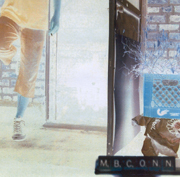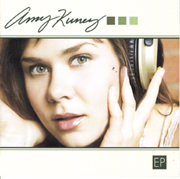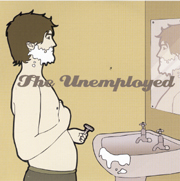|
Mbconn, Amy Kuney, The UnemployedBy Erik Kestler As a reviewer presented with many new CDs to sift through to find the gold, or even sometimes just some decent pewter, I try to consider the great difficulty in making music when I press play. A CD, whether bought or burned, is in many ways an illusion. The illusion is the simplicity of it. You press play, music happens. Lost are the studio hours, the years performing, learning, networking, listening. Lost are the many people, from the players to the producers to the studio hands to the harried significant others. We love the illusion, and it is a good one. For a very long time, when we thought of Mozart, we thought of a great savant who put his notes to the page quickly and without correction, as though he were setting down those nearly perfect melodies as is. Yet recent music scholarship has uncovered multiple drafts, trials, thrown-out sections, tangled ink in the margins — corrections. We have recently come to know that music was hard for Mozart, too. The good news is that there was a Mozart after all. Somehow, for all the factors that had to come together to make a Mozart. And also that there are still plenty of people with talent who are putting in the hard work to make music. Of the many new pop CDs that have arrived in my mailbox this year so far, I will spin three of them in this article: Mbconn's heavy curtain of sound in From Black to Purple (Electronic Productions, 2006) and self-titled EPs from Amy Kuney (Spin Move Records, 2006) and The Unemployed (Creeque Alley Records, 2006). But first, a word must be said about the musical event of the season: the passing of the great Hungarian avant-garde composer György Ligeti, who died on June 12 at age 83. In a summer of increased anti-Semitism (the hostage crisis and war in south Lebanon, Joe Lieberman's primary in Connecticut, the formerly likable Mel Gibson's drunken rant to arresting officers), it is one thing to discuss the life and work of any Holocaust survivor. Add to this the further indignity of Soviet control of his country and early compositions. Yet somehow, he made music, and music that was as difficultly beautiful as any ever made (his performers might have cursed his name had he not been of such famously good cheer). One wonders how, after a silent period of self-reevaluation from 1977-1982, he came out with the Trio for Violin, Horn and Piano, with its classical form twisted like Play-Doh and three instruments more varied in character than in any film: the proud, jocular piano; the loving but nervous violin, which screeches in terror off in the musical distance when piano and horn lock in battle in the final movement; and the horn, always somewhere lurking, ready with its unruly humor, like a particularly effective jack-in-the-box. Most people know Ligeti through his '60s choir pieces in 2001: A Space Odyssey. And no one knows what was to be his last masterpiece, the setting of Alice in Wonderland he had dreamed of composing since first reading the book in translation as a boy — which he started far too soon before his death. Alas, even the great composer obsessed with time and nonsense falls behind in the Red Queen's race. Among Ligeti's biggest fans are Radiohead, the guy around the corner who books local bands on Calvert Street (he MySpaced me that sad morning) and a guy who dressed always in black who taught me everything I knew about music when I was a music student. RIP, Ligeti: You are missed. But such is the musical art that one thing even tragically lost leads to a new generation with a glimmer in its eyes of the old. Strangely, the three CDs that most impressed me this season are all by performers from the Midwest. Or it is strange, considering that is the home of the best lyricist since Morrissey, Conor Oberst of Bright Eyes? And The Flaming Lips. And electric blues. And oh, yes, Dylan. Much to my pleasure these nights has been the turbulent mind pop of downtown Chicago's Mbconn. This is one person, whose name is Alex Loesche. But you'd swear it was 10 people. Mbconn's bio documents addictions to various bands and subsequent withdrawals. And a few words about "psychedelics." The cover art of his new CD, From Black to Purple, is as dark and overflowing as the music: Violet and deep pink typed letters of all sizes spill over the edges of the case onto its sides. A lawn chair lay overturned under several sunspots and a warped sky. Mbconn's CD is exactly the kind you would put on late at night — maybe very late, with minimal lights, a few sticks of incense and a lover who gets your interior darkness (and maybe some of the aforementioned psychotropics). From Black to Purple is an instant grabber, from its first notes. A distant, but apt, comparison, would be The Kingsmen's song "Louie, Louie." Recorded with singer Jack Ely's head cocked because there wasn't enough room in the studio, the band thunders through those familiar chords with such ferocity they turn to lava. It's good, I-don't-give-a-damn music. They even mess up, after the solo, when Ely, risking neck pain, comes in too early with his vocal. Like letters spilling over the edge of the case. From Black to Purple spills like this. Like The Kingsmen, Mbconn growls, in a punk way, and the words are lusciously blurred, becoming more like an instrument or a thought trying to form. You can listen deeply to Mbconn and get half the words. Maybe all if you listen hard enough. And behind it all the music jars like a disaster film soundtrack. It is atmosphere, and a heady one at that. You almost can't breathe, you almost are lost. But it is beautiful and provides many hidden crags and narrow valleys to visit. And not one bad track on the album. If you do not enjoy such dark sounds, From Black to Purple may not be for you. But those of us who savor the sweet sounds in melancholy will find Mbconn's From Black to Purple a delicacy of rare order. Suitable as a Christmas or Hanukah gift or for deep-night excursions with fragrant musk sticks and a pipe of kush. From the darkened-room, Brit Pop-infected days of my youth, we move to what may be called a "find": Oklahoma's Amy Kuney. The Tulsa daughter of a missionary family will turn drinking age this year — and may also turn into a star soon enough. Her eponymous EP is full of such pretty melody you wonder why birds sing at all. This is pure, and lush, pop music. The demand of the genre, and I'm sure Kuney knows it, is a hit. One hit and she's in. And she may have a couple. Not many new albums have you humming their melodies without realizing it hours later. But so it is with "How the Wind Must Feel" and "Breaking Bad Habits." I dare say, all six songs on Kuney's EP will have you humming and wondering about stolen freedom and bad relationships and good motherhood and baseball. This is not dumb pop. Kuney cites as her first big influence, at age 12, The Hanson Brothers' "MMMBop" (and now I feel older than Ligeti). But clearly, she's moved far beyond this. This is the sort of pop that warms even the hardest of hip hop heads and unlocks the mind. Not liking Amy Kuney would be like not liking chocolate. Some people may not like chocolate, but what's wrong with you? Get the EP now and invest early in the rise of a star that may bring more light to your night rides home. Last, we visit Hickory Hills, Illinois, an anonymous suburb on Chicago's South Side. The Unemployed are a brilliant band in that baroque Shins sort of way: lots of instrumentation and intertwining melody, but always somehow easy to hear. It's fun music that entertains polyphony. Their cover of "Love Is Strange" jumps from tasty acoustic guitar plucking with quick countrified electric fills to synthesized organ via Weezer to thrash confusion that makes your feet move. And lead singer and songwriter Brian Broscoe has just the perfect voice for The Unemployed's songs of love and neuroses. The band's Achilles' heel, though, is its lyrics. This is true of quite a few of my favorite new bands (Take Interpol: "I feel like love is in the kitchen with a culinary eye/I think he's making something special and I'm smart enough to try"). Too often with The Unemployed you know what words are coming next. Ugh. But it's not an unfixable problem as they move into their first full-length CD: Mix down the vocals (like Interpol) or simply write better ones, however possible. But don't stop making music. It's too good to miss. On a final note, readers always ask if reviewers really believe in
the CDs they recommend. Are these the sorts of CDs I would play in my
free time, adding them into the mix of the many others I might play
(thanks for the chat this past Friday, Rowena!)? My answer is yes. Also,
I do play the discs for parties and guests before reviewing them, to
get other ears involved. Robert, a painter friend with a knowledge of
different musics the size of the DSM-IV, took a pass on many things
but is hooked on Mbconn. And Jessie, who can sing along to every lyric
to every radio pop song of the past 15 years, rocked out to Amy Kuney.
In a world that can sometimes get hard, it's friends that make it so
much easier.
|


